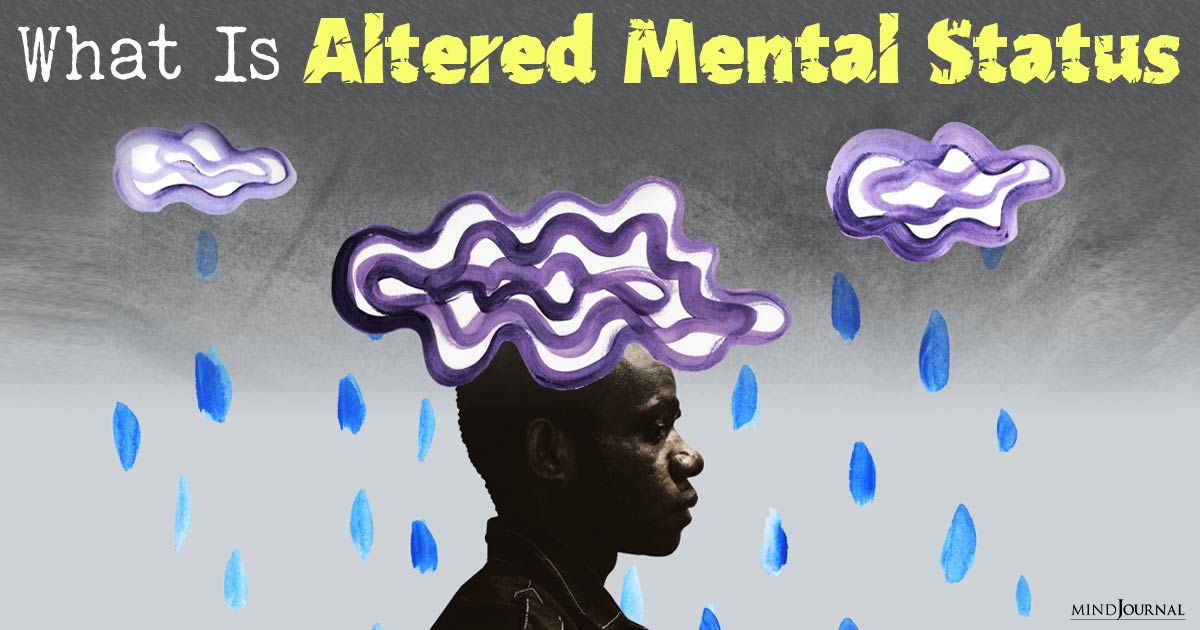Have you ever experienced confusion, disorientation, or memory loss? These are all symptoms of altered mental status, a condition that can have serious consequences. Let’s explore more about the causes, symptoms, and treatments for this critical medical condition.
What is altered mental status?
Altered mental status meaning: Altered mental status (AMS) refers to changes in a person’s cognitive abilities, including their attention, memory, awareness, and consciousness.
The wide range of signs and symptoms of altered mental status that characterize the condition include
- Confusion
- Disorientation
- Memory loss
- Agitation
- Unresponsiveness
AMS can have a variety of underlying causes, such as infections, head injuries, hormonal imbalances, metabolic disorders, drug and alcohol abuse, and neurological conditions.
It is a serious medical concern that requires immediate attention, as it can be life-threatening in some cases. Early diagnosis and treatment are important to prevent further damage to the brain and improve outcomes.
Related: How Cognitive Distortions Harm Us

Understanding altered mental status meaning
AMS is a medical condition that affects a person’s thinking and awareness. It’s like a computer malfunctioning and not working properly. Just like a computer, the brain needs to be in good working order to operate smoothly.
However, there are many things that can cause the brain to malfunction, such as infections, hormonal imbalances, head injuries, drug and alcohol abuse, and other medical conditions.
When the brain malfunctions, it can cause a wide range of symptoms, such as feeling confused, lost, or disoriented. It’s like feeling lost in a maze or not knowing where you are. In some cases, a person may not be able to respond to their surroundings or even recognize loved ones.
It’s like their brain is in a fog or a dream-like state. AMS can be very serious and requires immediate medical attention, just like a computer that needs to be fixed by a professional.
Altered mental status examples
Now that we have a fair idea about altered mental status meaning, let’s take a look at some altered mental status examples and case studies to have a better idea about the condition –
John, age 75, seems more confused and disoriented lately. He’s been having trouble remembering things and getting lost on familiar routes. His wife notices he is having a harder time following conversations. This could indicate dementia or another cause of altered mental status.
Mary, age 82, suddenly became confused and agitated. She couldn’t remember her grandchildren’s names and didn’t recognize her daughter. She had a fever and urinated frequently. Tests revealed a urinary tract infection, which likely caused her AMS. Once treated with antibiotics, her confusion improved. This is another real-life altered mental status examples.
Jane, age 58, suddenly became disoriented and was unable to carry out simple tasks at work. She was restless at night and had memory lapses. Tests showed very high blood sugar levels, indicating untreated diabetes. Once her blood sugar was brought under control, her mental status returned to normal.
These altered mental status examples stated above can help you get a clear idea how the condition manifests in real life.
Signs and symptoms of altered mental status
The symptoms of altered mental status can vary depending on the underlying condition causing it. However, some common signs and symptoms of altered mental status include:
- Confusion: Difficulty understanding or processing information.
- Disorientation: Feeling lost or confused about time, place, or situation.
- Agitation: Restlessness, irritability, or anxiety.
- Unresponsiveness: Not responding to stimuli, such as touch or sound.
- Hallucinations: Seeing or hearing things that are not there.
- Memory loss: Difficulty remembering recent events or important details.
- Altered consciousness: Changes in awareness, such as feeling drowsy or sleepy.
Other common signs and symptoms of altered mental status may include –
- Difficulty speaking or understanding speech
- Changes in behavior
- Seizures
- Loss of consciousness
If you or someone you know experiences any of these symptoms, it is important to seek medical attention immediately.
Related: 15 Common Cognitive Distortions That Twist Your Thinking
What causes altered mental status
AMS, or changes in cognitive abilities, can be common in elderly individuals and can have a variety of underlying causes.
In the elderly, it is more common than in younger adults. This is because the elderly are more likely to have underlying medical conditions, such as dementia, stroke, and infection. They are also more likely to take multiple medications, which can interact with each other and cause AMS.
Some of the common causes of altered mental status in elderly include:
1. Dementia
Dementia is a progressive neurological disorder that can cause changes in memory, thinking, and behavior, and ultimately lead to this condition.
2. Delirium
Delirium is a sudden and severe change in mental status that can be caused by a variety of factors, including infections, medication side effects, and dehydration.
Delirium is more common in elderly individuals and can be mistaken for dementia. This is what causes altered mental status.
3. Medication side effects
This is another common causes of altered mental status in elderly. Elderly individuals are often taking multiple medications, which can increase the risk of medication side effects, including altered mental status.
4. Chronic medical conditions
Elderly individuals are more likely to have chronic medical conditions, such as diabetes, high blood pressure, and heart disease, which can increase the risk of AMS.
5. Nutritional deficiencies
Nutritional deficiencies, such as vitamin B12 deficiency, can cause changes in mental status and cognitive function in the elderly.
6. Sleep disorders
Sleep disorders, such as sleep apnea, can cause changes in cognitive function and lead to AMS in the elderly. This may be what causes altered mental status.
7. Infections
Infections, such as urinary tract infections, can cause changes in mental status in the elderly.
8. Dehydration
This is another factor to consider when finding out what causes altered mental status. Dehydration is more common in elderly individuals and can cause changes in cognitive function and lead to altered mental status.
9. Stroke
A stroke occurs when blood flow to the brain is interrupted, causing brain cells to die. Stroke can lead to a variety of symptoms, including AMS.
10. Other medical conditions
Other medical conditions that can cause AMS in the elderly include diabetes, heart disease, and kidney disease. These can also be considered as causes of altered mental status in elderly.
11. Substance use
Substance use, including drugs and alcohol, can affect the brain’s function, leading to changes in cognitive abilities, behavior, and consciousness. Substance-induced altered mental status can be dangerous, and immediate medical attention is necessary to prevent further harm.
It is important to note that AMS can also be caused by a combination of factors. For example, an elderly person with dementia who is taking multiple medications may be more likely to experience AMS than an elderly person with dementia who is not taking any medications.
If you are concerned that an elderly person in your care is experiencing AMS, it is important to seek medical attention immediately. Early diagnosis and treatment can help to prevent serious complications.
Related: Unlocking Your Brain’s Potential: The Top Brain Hacking Techniques You Need To Know
Diagnosing altered mental status
A medical professional is necessary to diagnose altered mental status meaning. The medical professional will conduct a thorough physical examination and take a detailed medical history.
They may also perform a range of tests, including blood tests, imaging tests, and neurological exams.
Treatment of altered mental status
It is important to seek medical attention as soon as possible if you or someone you know experiences changes in mental status.
The treatment of AMS depends on the underlying condition causing it. In some cases, such as infections or metabolic disorders, the condition can be treated with medication. In other cases, such as traumatic brain injury or stroke, the treatment may involve surgery or other medical interventions.
Preventing altered mental status
While it may not be possible to prevent all cases of AMS, there are steps you can take to reduce your risk. These include:
1. Avoiding drug and alcohol abuse
Long-term drug and alcohol abuse can cause damage to the brain, leading to this condition.
2. Managing chronic medical conditions
Managing conditions such as diabetes or high blood pressure can help reduce your risk of experiencing altered mental status.
3. Protecting your head
Wearing a helmet when participating in high-risk activities, such as cycling or skiing, can help protect your head from injury.
4. Getting enough rest
Getting enough rest and sleep can help improve cognitive function and reduce your risk of AMS.
Takeaway
Altered mental status is a serious medical condition that requires immediate attention. It can be caused by a variety of underlying conditions, including infections, head injuries, and drug and alcohol abuse.
The symptoms of AMS can vary depending on the underlying condition and can include confusion, disorientation, and memory loss.
If you or someone you know experiences changes in mental status, it is important to seek medical attention immediately. Detecting and treating altered mental status early can have a significant impact on the outcome.
While it may not be possible to prevent all cases of AMS, taking steps to reduce your risk, such as avoiding drug and alcohol abuse, managing chronic medical conditions, and protecting your head during high-risk activities, can help keep your brain healthy and functioning properly.
Remember, your brain is your most important asset, so take care of it!
Related: The Number One Exercise For Slowing Down The Aging Process, Studies Suggest
Frequently Asked Questions (FAQs):
What is the most common cause of altered mental status?
The most common cause of altered mental status is infections, which can affect the brain’s function and lead to cognitive changes.
How do you assess altered mental status?
Assessment of altered mental status involves evaluating cognitive function, behavior, and consciousness through physical and neurological examinations, lab tests, and imaging.
Is altered mental status confusion?
Altered mental status can include confusion, but it can also manifest in other ways, such as disorientation, memory loss, and unresponsiveness.










Leave a Reply